Poor Two-Face. One of comic's most (potentially) interesting characters, yet almost always badly botched in execution. And the saddest part is, all anyone has to do is read his FIRST STORY to know better.
Two-Face is about appearances.
 |
| It's the FIRST and foremost point made about him in the first panel of his first story. |
Or, perhaps it would be more accurate to say, "Harvey Dent was about appearances." Harvey Dent was very handsome and, frankly, vain, and his fiancée was written as an artist who worshipped beauty.
 |
| It's the reason Maroni's revenge was to throw acid at his face; it was the only way to truly hurt him. |
This is an aspect of the character which has been somewhat forgotten, I suspect, because (1) it's been so long (from out perspective) since Harvey Dent was around and (2) it seemed like simplistic Golden Age psychology. The idea that someone would go supervillain-insane just from getting scarred probably seemed naive to later writers.
 |
| Note the order: handsome, loved, respected. |
But nowadays in our image-driven culture where being camera-ready and telegenic is more important than ever before, it's an aspect of the character that should be revivified or at least remembered.
 |
| Batman is not really the friend you turn to for advice on how to deal with tragedy. "I recommend a strict course of weightlifting, chemistry, and criminology! Steady on, chum!" |
The movies actually did a better job on this aspect than the comics. I don't mean that they focused on Dent's vanity. But, unlike the comics, they acknowledged that as a District Attorney, Harvey wasn't a public employee--he was a politician, one for whom public image, appearances, were paramount. And that Harvey Dent was the Bright Knight of Gotham.
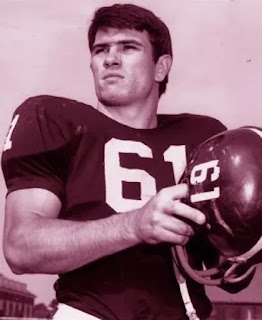 |
| It's so easy to imagine this man beating the crap out of Jim Carrey. |
Two-Face is an attorney.
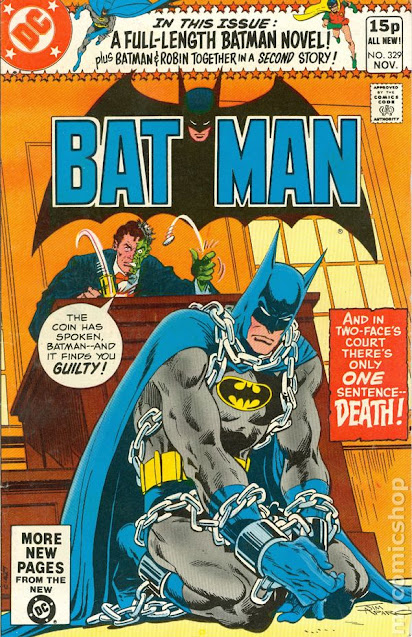 |
| Sigh; but every actor wants to direct. |
Sure, everyone knows he's a lawyer. But there's significance to it that many people miss. It's exactly the right profession to prepare Harvey Dent to become Two-Face. Attorneys are not trained to be on the side of Good or Evil. They are trained to look after their client's interest. They are trained to make a case, not to decide what's good or bad. In fact, the profession is premised on the fact that not only do the innocent get representation, so do the guilty. A case must be made for the Good; a case must be made for the Bad. An attorney must be prepared to make a case on behalf of either the Good or the Bad, at a moment's notice. You don't get always get a choice which you are arguing on behalf of.
That is, of course, exactly what Two-Face does, every time he flips his coin. Two-Face isn't a bizarre split from Harvey Dent; he's a logical continuation of him.
Two-Face is stable.
Let me unpack that statement, because it's my most important one. Too many--sadly, most--modern writers portray this characters as a sort of split-personality, with Two-Face as the "evil counterpart" of Harvey Dent.
Well... those people are idiots.
Ordinarily, I might be kind and simply call them "naive". After all, the most obvious model for Two-Face is Dr. Jekyll & Mr. Hyde, and that's how those guys rolled. Or it is "roled"?
 |
| It's on his splash page, after all. |
But it seems pretty clear none of those writers has read a single Golden Age Two-Face story and for that, I condemn them as idiots and posers. In his original stories, Two-Face wasn't an evil alternative personality to Harvey Dent; he was a morally ambivalent replacement. Yes, Two-Face is a criminal by default, but that's only because of the toss of a coin.
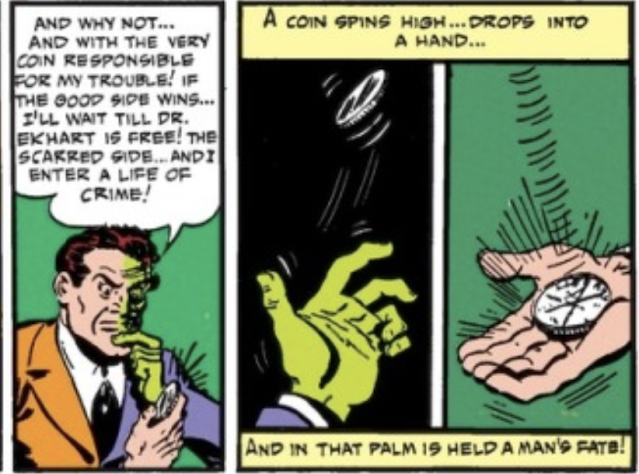 |
| They never DO explain where he got that suit. |
Harvey Dent didn't immediately snap and 'become evil". This is enormously significant. What happened is that his commitment to keep up appearances of being good was shattered when he realized he would look evil anyway.
Essentially, becoming Two-Face just dawned on him as the only sensible reaction to the random cruelty of the world.
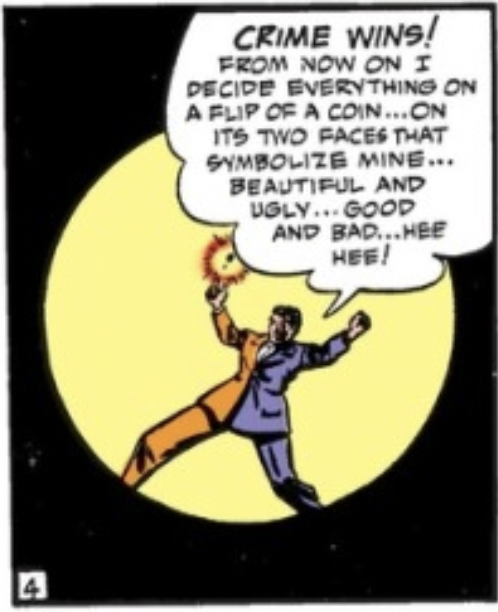 |
| Remember: in the Golden Age, no one in the Golden Age is ever officially crazy UNTIL they make That Pose. The technical term is The Golden Age Goofy Foot. |
Yes, he becomes a criminal, but one just as happy to do good as to do evil. And look HOW HAPPY IS IS ABOUT IT.
 |
| HEE...HEE! |
And why shouldn't he be? It's an enormous relief. He no longer has to take responsibility for any of his decisions. Two-Face is, on the whole, happy and stable... something that we realize in later years Harvey Dent probably wasn't. This is what makes Two-Face scary; this is what makes Two-Face threatening. Not that he's some "evil half" that can't be overcome. Some pretty basic therapy would get Harvey Dent to accomplish that if that were the issue. The problem is: he already has. THAT'S WHAT TWO-FACE IS.
Two-Face isn't "Harvey Dent's evil half". Two-Face is Harvey Dent's way of reconciling his impulses toward good and those toward evil. The reason Two-Face is so hard to exorcise is that Two-Face isn't Harvey Dent's problem; he's his solution.
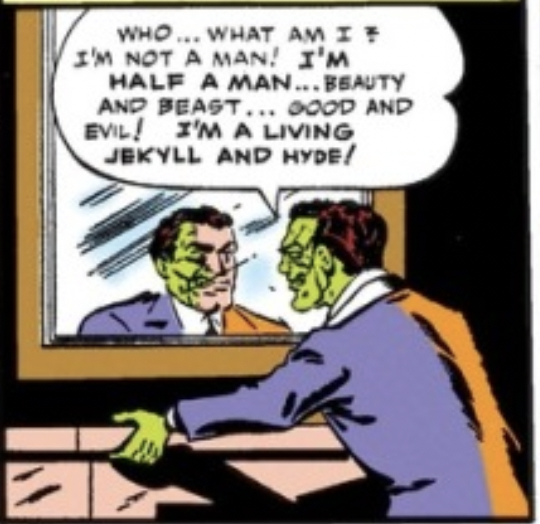 |
| He's not Jekyll. He's not Hyde. He's Jekyll AND Hyde. Two-Face isn't evil; he's good AND evil. How much clearer could it be? |
So when I say "Two-Face is stable" I mean: not only is Two-Face not a split-personality, he in fact represents the stable integration of any possible conflicting impulses within Harvey Dent, and that's why he is resistant to treatment. As long as he has his coin as a scapegoat, you can't offer him an easier alternative.
 |
| "YES, I SUPPOSE I LOOK QUEER... BUT I'M NOT ASHAMED ANY MORE! NOW I FLAUNT MY TWO SIDES... LIKE A FLAG..." Perhaps updating Two-Face might have more sense than Tim Drake. |
Two-Face has his cakes and eats them, too.
This one's tricky and one only the best writers pull off. But it's a logical extension of the other concepts we've been discussing: Harvey's focus on appearances, his background in the morality-neutral field of law, and reconciling power of his identity as Two-Face. In short, Harvey Dent/Two-Face often finds a way to do good and evil at the same time.
In his Harvey Dent days, this is usually shown as a willingness to use shady tactics in his prosecutions.
In his Two-Face days, it's usual shown in schemes to control both the police and the underworld at the same time.
 |
| As he does on Harley Quin. I have to note that even the Harley Quin animated series, not known for 'respect', manages to get Two-Face better than most authors do. |
A lesser author writes Two-Face as a zero-sum game: either his 'good side wins' or 'his bad side wins' in any situation. A greater author writes Two-Face as smarter than that. They know that Two-Face can arrange things so that both Good and Evil are satisfied... at least, in his own mind.
 |
| Here, he steals, as criminals do. But from another gangster. And gives the loot to an orphanage. Both good and evil are served. |
The perfect--and most chilling example--is right there in his very first story.
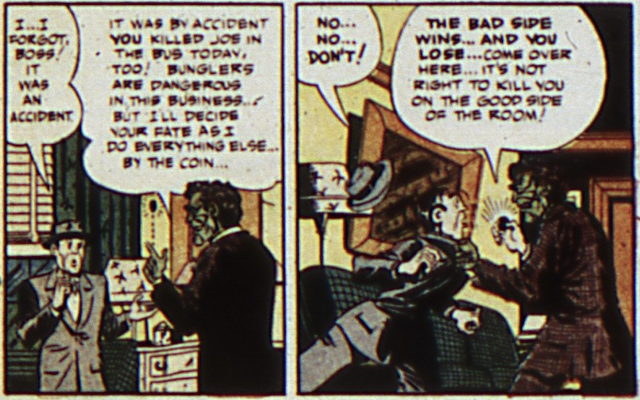 |
| The coin lands bad so Two-Face decides to be villainously unforgiving and kill a henchmen who made some mistakes. |
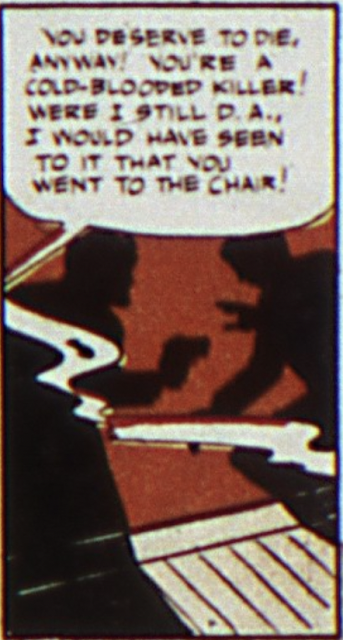 |
| But killing him is exactly what he would have tried to do as D.A. Good is served at the same time as Evil. |
That's... some deep and twisted stuff. And more psychologically sophisticated that 99% of everything in every subsequent Two-Face story. Especially when you consider that what's underpinning this is Two-Face's OWN guilt:
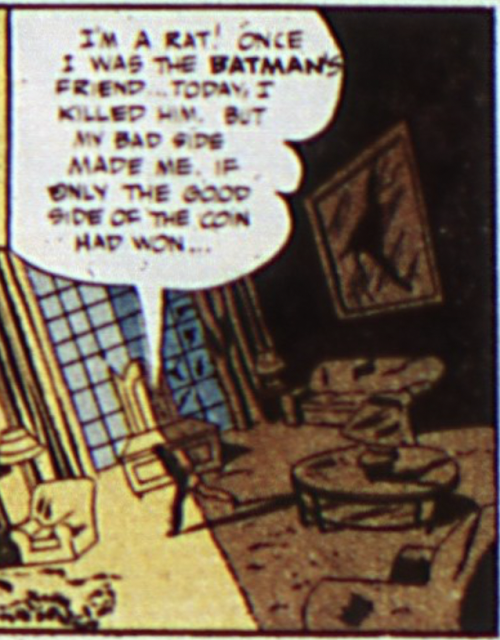 |
| Spoiler: Batman's not actually dead. |
Two-Face's is feeling guilty about having been Bad and for making a mistake that day and (apparently) killing Batman. But unable to face the responsibility for his actions, he punishes one of his own gang for making a mistake that day and being a killer ... and paints it as an act of virtue.
Now, that is psychology. Not "Harvey" talking to "Two-Face" in two different color word balloons as if he's the Ventriloquist. That's not merely unsophisticated, it's goofy to the point of childish and dysfunctional to point of crippling.




I want you to write all the Two-Face stories, because your take on him is the one that makes him the most interesting. It's rooted in the original appearances so maybe I shouldn't call it "your" take, but it's not like there's a modern writer known for that approach, so I guess it's yours now.
ReplyDeleteAs you say, there's a tension between Harvey obeying the coin and just doing what he was planning to do in the first place, and some writers get that. A long time ago you commented favorably on a Nightwing story in which Two-Face had leased some trucks for a scheme of his -- leased, we may assume, because the coin came up "good" side. But the choice of steal vs lease had no significant impact on his scheme.
About Jekyll and Hyde, to the best of my understanding, the chemical didn't actually turn Jekyll evil; what it did was change his appearance, and from there, Jekyll finally had an outlet for his repressed urges. Hyde offered anonymity, and once Jekyll had that, he cut loose more and more. I haven't read the book but I trust OSP to do the reading for me:
https://www.youtube.com/watch?v=3kUElZGMXm8
Anyway, Jekyll / Hyde may actually be closer to "your" Two-Face than is commonly understood.
Thank you. But I don't think of it as 'my take'; I don't think of it as a 'take' at all. It's The Character, since it's exactly how he is defined by his original story.
ReplyDeleteLike the speaker in the video, you linked, I have read Stevenson's original story; repeatedly. It's ... opaque. In the way that only Victorian literature can be. What actually happens and why is difficult to suss out; certainly compared to Two-Face's origin.
Agreed on the Two-Face-as-spilt-personality nonsense; the attack in court changed Harvey, it didn’t create someone new.
ReplyDeleteI haven’t read the Golden Age Two-Face stories, but that approach to the character is fascinating. Was his fixation on the number 2 in the original comics? I find he works better without it. “Someone robbed the jewelry store at 22 Second Avenue! Who could it be?” Oy.
(Above was me.
ReplyDelete-Mike Loughlin)
"Was his fixation on the number 2 in the original comics? "
ReplyDeleteActually, it was a SECRET theme to his crimes that he thought no one would notice. But the World's Greatest Detective eventually figured it out.
That’s much better! Smart Batman who is also good at punching is the best Batman. “Batman doesn’t do enough detective work these days” is a cliche fan complaint, but it’s not wrong.
ReplyDelete- Mike Loughlin